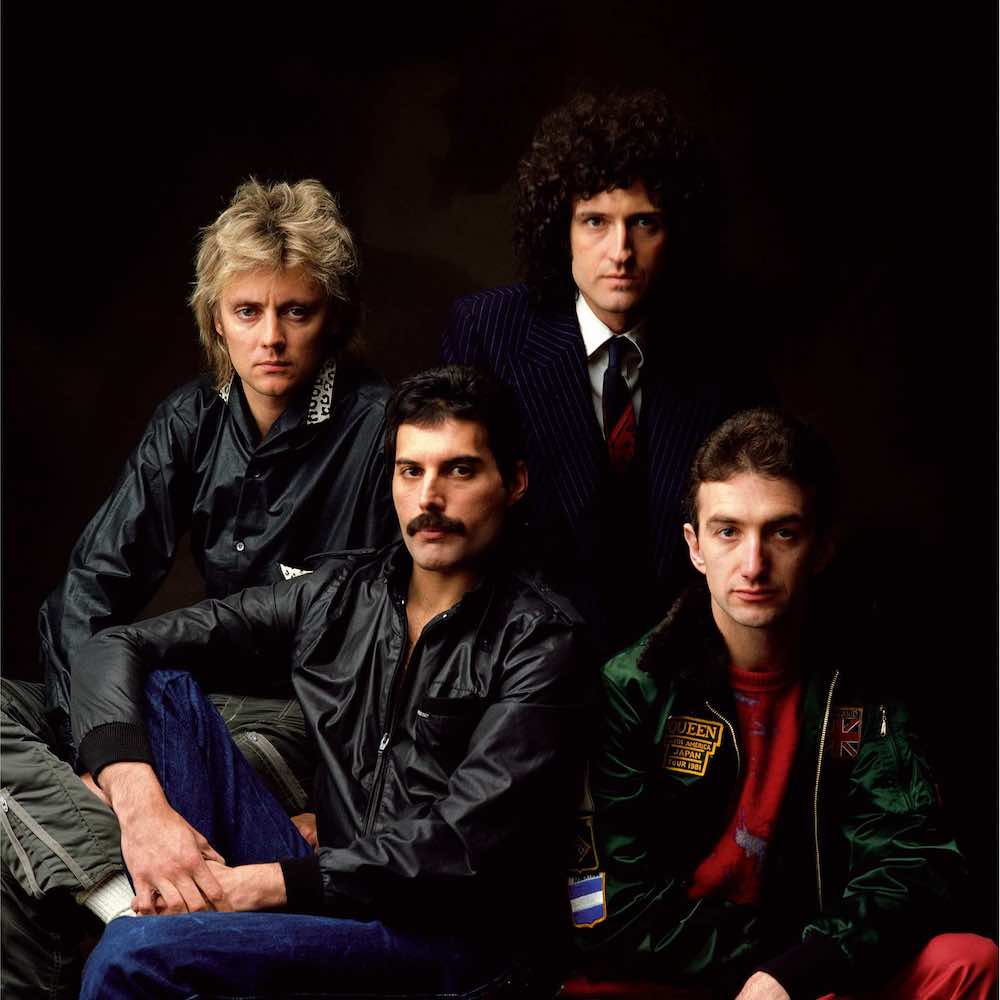Have you ever stopped to think about the true architects of rock music's most unforgettable moments? You know, the ones who didn't just play songs but truly commanded stages, creating something that felt, well, a bit like a magnificent, thorny crown? We're talking about a group whose presence was so sharp, so impactful, and so utterly unique, they could easily be called the queen of thorns of the music world. They carved out a space all their own, leaving a mark that's still felt today, and that, is that, really something to ponder.
This particular "queen of thorns" wasn't a person, not exactly, but a collective force, a band that burst onto the scene in London back in the 1970s. Their sound was, in a way, a blend of so many things, a true rock tapestry that included elements of heavy metal, glam rock, and a flair for the theatrical that was just incredibly captivating. They truly redefined what a rock concert could be, actually, making every performance an event.
Their journey, from their early days to becoming global icons, shows a persistence and a creative spark that few others have matched. So, let's take a closer look at how this remarkable group, the true "queen of thorns" in rock, built their extraordinary kingdom of sound and spectacle, and why their influence continues to prickle our ears and hearts with its timeless appeal, even now, in some respects.
Table of Contents
- The Genesis of a Legend
- Defining Their Sound: Glam, Metal, and Theatrics
- The Unforgettable Live Aid Moment
- The Legacy Lives On: Post-Mercury Era
- Queen: A Discography of Dominance
- Frequently Asked Questions About the Queen of Thorns
- The Enduring Impact
The Genesis of a Legend
The story of this musical "queen of thorns" began in London during 1970. It was a time when new sounds were bubbling up, and four individuals with immense talent decided to join forces. The core group included Freddie Mercury, who handled the lead vocals and piano, Brian May, who played the guitar and added his voice, and Roger Taylor, who took care of the drums and also sang. Later, John Deacon joined them, filling the bass role, and completing what would become an iconic lineup, really.
This quartet, comprising Freddie Mercury, Brian May, Roger Taylor, and John Deacon, started a journey that would leave an absolutely unforgettable mark on the world. Their early days were about finding their voice, honing their craft, and developing a stage presence that would soon become legendary. They were, in a way, planting the seeds of their thorny, magnificent reign, preparing to burst forth with something quite different.
Their formation wasn't just about putting musicians together; it was about creating a chemistry that would allow them to produce rock anthems that resonated with millions. They were, you know, building something special from the ground up, piece by piece, song by song. The foundation they laid in those early years was incredibly strong, providing the base for all the amazing things that followed, and that, is truly a testament to their vision.
Personal Details: The Band Queen
| Formation Year | 1970 |
| Origin City | London, England |
| Founding Members | Freddie Mercury, Brian May, Roger Taylor |
| Later Joined By | John Deacon (Bass) |
| Key Genres | Rock, Hard Rock, Glam Rock, Arena Rock, Pop Rock |
| Core Lineup | Freddie Mercury, Brian May, Roger Taylor, John Deacon |
| Active Until (Original Lineup) | 2009 (with breaks and varying activity) |
| Notable Collaborations | Adam Lambert (since 2012) |
Defining Their Sound: Glam, Metal, and Theatrics
What truly made this "queen of thorns" stand out was their distinctive sound, which was, in some respects, a bold fusion of different musical styles. They weren't content to fit neatly into one box; instead, they blended heavy metal's raw power with the dazzling spectacle of glam rock. This combination, you know, gave them a unique edge, allowing them to create music that was both powerful and incredibly captivating.
Beyond just the musical genres, they brought a strong sense of camp theatrics to their performances. This wasn't just about playing songs; it was about putting on a show, a grand spectacle that engaged all the senses. Their live performances were, in a way, like elaborate productions, filled with drama, energy, and an undeniable flair that kept audiences absolutely mesmerized. It was a vital part of their identity, really, making them much more than just a band.
Freddie Mercury himself once spoke about their songs, declaring them to be "like bic razors." He meant they were "for fun, for modern consumption." This simple statement captures a lot about their approach: sharp, effective, and designed to make an immediate impact. Their music, much like the thorns of a rose, had a cutting quality, something that grabbed your attention and held it firmly. They knew how to deliver a punch, musically speaking, and that, is a skill few possess.
Their ability to weave together these disparate elements—the crunch of heavy guitar, the glitter of glam, and the sheer theatricality of their presentation—made them one of the most popular groups of the 1970s and beyond. They didn't just follow trends; they set them, creating a sonic landscape that was both familiar and startlingly new. This willingness to experiment, to push boundaries, was a hallmark of their creative spirit, and it's something that, honestly, truly made them special.
The Unforgettable Live Aid Moment
Perhaps one of the most defining moments for the "queen of thorns" happened on July 13, 1985. It was a day that etched their performance into the annals of music history forever. At precisely 6:41 PM, at Wembley Stadium in London, Queen stepped onto the stage as part of Live Aid. This massive event, organized by Sir Bob Geldof and Midge Ure, aimed to raise crucial funds for the Ethiopian famine, and it was, actually, a truly global effort.
Their set at Live Aid was nothing short of legendary. Freddie Mercury, with his unparalleled stage presence, commanded the enormous crowd with an energy that was almost unbelievable. The band delivered a performance that many consider one of the greatest live acts ever. They captivated the audience, both in the stadium and watching around the world, showing just how powerful their music and their collective charisma could be. It was, you know, a moment where everything just clicked perfectly.
The sheer scale of their performance, the way they connected with every single person, highlighted their mastery of the live arena. They weren't just playing songs; they were creating an experience, a shared moment of pure musical exhilaration. This event, in a way, solidified their status as titans of rock, demonstrating their ability to move and unite vast numbers of people through their artistry. It was, very much, a peak moment in their long and storied career.
The impact of that particular performance resonated far beyond the stadium walls. It showcased their incredible talent to a new generation and reaffirmed their status for existing fans. For many, it's the first thing that comes to mind when thinking about the band, a testament to its raw power and emotional depth. It's almost as if, through that performance, they truly cemented their place as the undisputed "queen of thorns" of live music, leaving an indelible impression on everyone who witnessed it, even indirectly.
The Legacy Lives On: Post-Mercury Era
Even after the passing of their iconic singer, Freddie Mercury, the spirit of the "queen of thorns" continued to resonate. Despite the absence of some of its original members, the band remained active, in various forms, until 2009. This showed a remarkable dedication to their music and their fans, proving that their legacy was built on more than just one person, as amazing as Freddie was, of course.
Since 2012, Queen has enjoyed a fruitful collaboration with the American singer/songwriter Adam Lambert. This partnership has allowed Brian May and Roger Taylor to continue performing their beloved songs for new audiences around the globe. They have toured extensively, bringing their incredible rock anthems to North and South America, Europe, the UK, Asia, Australia, and New Zealand. It's been, you know, a pretty remarkable second act for the band.
This ongoing collaboration demonstrates the enduring appeal of Queen's music. The songs themselves, with their sharp melodies and powerful messages, truly stand the test of time. It's a testament to the original songwriting and the sheer quality of the compositions that they can still fill stadiums decades later. The band, in a way, continues to bloom, with new thorns and blossoms appearing, keeping their presence felt in the music world.
The ability of Queen to adapt and continue sharing their music with new generations is a rare feat in the music industry. It shows their resilience and their commitment to the art form they helped define. This continued activity ensures that the "queen of thorns" remains a vital part of the contemporary music scene, influencing new artists and delighting long-time fans alike. They are, quite simply, still here, still making noise, and still captivating audiences, which is, truly, something special.
Queen: A Discography of Dominance
The musical output of the "queen of thorns" is, frankly, quite vast and impressive. Over their long career, British rock band Queen has released a significant number of recordings that showcase their incredible range and consistent quality. They have, in a way, built a towering discography that stands as a monument to their creative power, and that, is really something to behold.
Their collection includes 15 studio albums, each one a unique chapter in their evolving sound. These albums contain some of the most recognizable and beloved songs in rock history. Beyond the studio recordings, they have also released 10 live albums, which capture the raw energy and excitement of their legendary performances. These live recordings, you know, give listeners a chance to experience the band as they were on stage, which was always a major part of their appeal.
Additionally, their discography features 16 compilation albums, which often bring together their greatest hits and fan favorites, making it easy for new listeners to discover their work. There are also 2 soundtrack albums, showing their ability to create music that perfectly complements visual storytelling. They also released 2 extended plays (EPs), providing shorter bursts of their creative genius, which is, pretty neat, actually.
When it comes to singles, the numbers are even more staggering: 73 singles and 7 promotional singles. This sheer volume of releases speaks to their prolific songwriting and their constant presence on the airwaves and music charts. Each single, in its own way, was like a sharp, memorable thorn, designed to stick in your mind and become an instant classic. This immense body of work, honestly, proves their enduring impact and their status as a true powerhouse in music, very much so.
In 2014, the band released a new compilation called "Queen Forever." Around that time, Adam Lambert, alongside guitarist Brian May and drummer Roger Taylor, sat down with Classic Rock magazine to share the story behind what they called "one of the most unexpected comebacks in rock." This event, you know, highlighted how their music continues to find new life and new audiences, proving that the "queen of thorns" remains as relevant as ever, even today.
Frequently Asked Questions About the Queen of Thorns
People often have questions about this iconic group, especially when thinking about their incredible impact and the way they've been, in a way, the "queen of thorns" of rock music. Here are some common inquiries:
Who was the "queen of thorns" in music history?
While the term "queen of thorns" is often associated with other contexts, when we look at music history, the British rock band Queen certainly fits the description. Their sharp, impactful sound, their commanding stage presence, and their ability to create music that truly sticks with you, much like a thorn, makes them a perfect fit. They were, in a way, fiercely unique and left an unforgettable impression on the music world, literally.
What made Queen's live performances so impactful?
Queen's live performances were legendary for several reasons. First, there was Freddie Mercury's incredible showmanship; he had an unmatched ability to connect with massive audiences. Then, the band's tight musicianship and their knack for blending different musical styles created a dynamic sound. Finally, their theatrical approach turned every concert into a grand spectacle, making each show an event people remembered long after it was over. It was, you know, a complete package of entertainment.
How did Queen's sound evolve over time?
Queen's sound was always evolving, which is part of what made them so exciting. They started with a foundation in hard rock and heavy metal, but quickly incorporated elements of glam rock, pop, and even opera into their music. They weren't afraid to experiment with different instruments and arrangements, which allowed them to create a diverse catalog of songs that ranged from powerful anthems to intricate ballads. This constant evolution was, in a way, a sign of their creative vitality, and that, is something to admire.
The Enduring Impact
The influence of the "queen of thorns" on music and culture cannot be overstated. From their formation in London in 1970, with the iconic lineup of Freddie Mercury, Brian May, Roger Taylor, and John Deacon, they set a new standard for rock music. Their fusion of heavy metal, glam rock, and camp theatrics wasn't just a style; it was a statement, a bold declaration of their unique artistic vision, and that, is something truly special.
Their unforgettable live performances, like the one at Live Aid in 1985, showcased their incredible power to connect with audiences on a global scale. They didn't just play songs; they created moments, shared experiences that transcended mere entertainment. Their discography, with its vast array of studio albums, live recordings, and singles, stands as a testament to their prolific creativity and their ability to craft timeless anthems that still resonate today, very much so.
Even with the passage of time and the absence of some of its members, the band's legacy continues to thrive, particularly through collaborations like the one with Adam Lambert. This ongoing presence ensures that the music of the "queen of thorns" continues to inspire new generations of musicians and fans. Their songs, much like those "bic razors" Freddie Mercury spoke of, remain sharp, effective, and perfectly suited for modern consumption, proving that true artistry, honestly, never fades.
So, the next time you hear a Queen song, take a moment to appreciate the depth of their artistry, the boldness of their sound, and the enduring power of their performances. They are, in a way, the ultimate "queen of thorns," a band whose legacy is as beautiful and captivating as it is sharp and unforgettable. Learn more about Queen on our site, and check out this page for more details about their journey, it's really quite fascinating.
Related Resources:



Detail Author:
- Name : Dr. Candida Zieme
- Username : rita.lebsack
- Email : bmclaughlin@yahoo.com
- Birthdate : 1970-08-10
- Address : 2586 Hickle Drive Paucekberg, ME 10753
- Phone : +1 (820) 676-1669
- Company : Farrell LLC
- Job : Soil Conservationist
- Bio : Rerum et at ab nisi rerum non. Vitae accusantium culpa adipisci aliquid quasi. Voluptatum perferendis eos ad est eaque.
Socials
tiktok:
- url : https://tiktok.com/@dessie.howell
- username : dessie.howell
- bio : Soluta minima fuga vitae enim.
- followers : 354
- following : 1254
twitter:
- url : https://twitter.com/dessie5761
- username : dessie5761
- bio : Beatae quos nulla quia dolores ut tempore doloremque. Accusamus aspernatur expedita soluta natus. Soluta dolorum ea et eos magnam doloribus impedit.
- followers : 5124
- following : 2750
facebook:
- url : https://facebook.com/dessie3462
- username : dessie3462
- bio : Omnis repellendus exercitationem molestiae ut eligendi ex.
- followers : 5821
- following : 419